Burma’s protesters may have been silenced, but we must continue to support them, writes Brendan Barber in The Guardian. But maybe we should not focus too much upon the courage of the monks. Muslims in Burma are persecuted, not only by the military, even by the ‘peaceful’ monks according anthropologist Gabriele Marranci:
From an anthropological viewpoint, the revolt in Burma is particularly interesting for an anthropologist specialised in Muslim societies and communities. There are two elements that attract my attention. First of all, how this revolt is represented by the western mass media and secondly, the near total lack of reference to the drama that the Muslim minority, the so called Rohingya Muslims, have experienced in the last three decades. There are some hard stereotypes which affect how the mass media represent religions, and consequently, how ordinary people understand religions.
Muslims in Burma are a persecuted minority - a story that the mass media neglects to inform us, he writes. The omission, when compared, is according to the anthropologist “not very dissimilar from the western attitude towards other Muslim minority and refugee tragedies".
He explains:
The Rohingya Muslims live mainly in the North of the Rakhine State and represent, officially, 4% of the entire Burmese population, but represent 50% of the population of Rakhine state (previously known as Arkana) itself. (…) In 1784, a Burmese king, Bodawpaya, annexed Arkana to his domain. This provoked a long guerrilla war with the Muslims, which saw, according to historians, more than 200,000 Arkanese killed. Many of the local Muslim population, at that time, were reduced to slavery and forced to build Buddhist monasteries. (..)
Muslims in Burma are not considered to be citizens. They have no rights and often suffer discrimination and indiscriminate killings. Many of them, in particular after 1962, had to flee the country and still today live in refugee camps in Bangladesh, which actually do not welcome them. Although Muslims have taken active part in the 1988 revolt, and paid the consequences more than the Buddhist population, the majority of monks and Buddhists in Burma have anti-Muslim sentiments, in particular based on the fear of possible intermarriages.
Pamphlets glorifying race purity and Buddhism and actually reinforcing anti-Muslim sentiments have been distributed since 2001 (i.e. Myo Pyauk Hmar Soe Kyauk Hla Tai or The Fear of Losing One’s Race). These inflammatory publications, preaching against the Muslim minority, as well as rumors spread about Muslims raping children in the streets, provoked a series of monk-led riots against Muslim families and the destruction of mosques. Muslims were killed and mosques destroyed, and again the Rohingya Muslims had to flee to Bangladesh.
(…)
Everybody hopes that the Buddhist monks can succeed in mobilising the population in a sort of Intifada. Some Muslims, I know, are repeating their Inshallahs in the not so distant Rohingya refugee camps in Bangladesh. They hope that the end of the military junta means the end of their oppression.
Nonetheless, a question remains, after such strong monk-led anti-Muslim campaigns which were also reinforced by the welcomed ‘Bushit’ rhetoric of ‘war on terror’: would the new, certainly Buddhist, regime accept the history and the existence, as Burmese citizens, of Rohingya Muslims? Or, would the new regime, like their predecessor generals the Muslims as an easy scapegoat?
>> read the whole article on Gabriel Marraci’s blog
A few days after his blog post, mainstream media has started writing about the discrimination of muslims and minorities in Burma - but without reference to the monks, see the CNN-story Myanmar’s ethnic minorities suffer a ‘hidden war’
UPDATE: See also Martijn de Koning: Muslims in Burma (Closer, Anthropology of Muslims in the Netherlands)
UPDATE According to South Asia Analysis Group, the Burmese muslims in Rakhin “have strongly come out in support of the uprising against the military junta spearheaded by the Buddhist monks, students and others". On 26 September 2007, the Rohingyas and Rakhaings had jointly participated in the demonstration staged by the Buddhist monks forming human chains in Akyab chanting the slogan: “We are a family and we are travellers in the same boat, we Burmese citizens need to be united without regard to religion, class or race.”
Supporters of Burmese protestors from around the world are planning a global day of protests on 6 October according to the Democratic Voice of Burma.
MORE INFORMATION:
Wear red shirts on friday - Anthropologists on the protests in Burma?
Guardian Special Report: Burma
BBC News Special Reports: Burma Protest
Wikipedia: 2007 Burmese anti-government protests
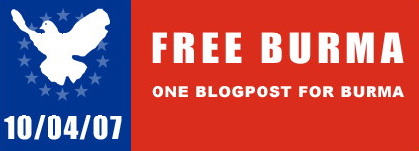
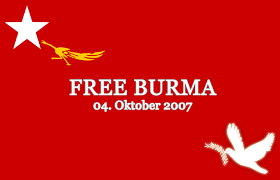


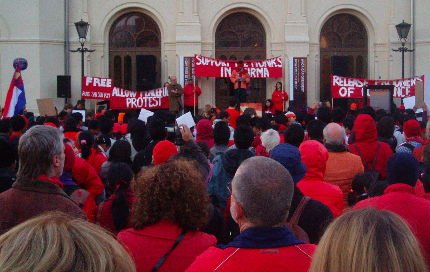
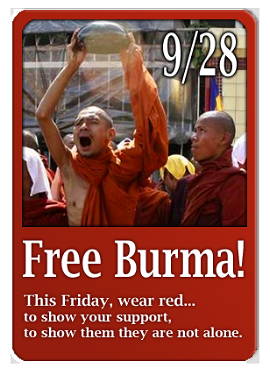

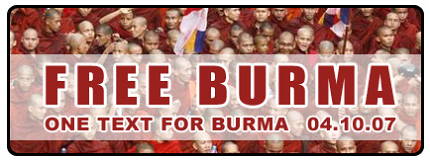
Recent comments